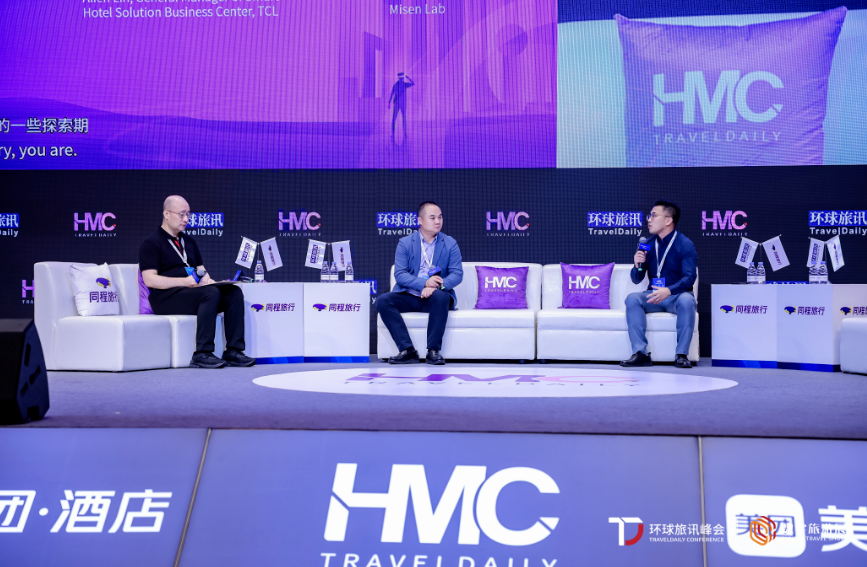Digital intelligence is both a digital extension and a combination of intelligence. With the outbreak of artificial intelligence, the hotel industry has also accelerated its process of intelligence.
However, at this stage, we must face up to a reality: not all intelligent solutions can bring value to the hotel, and the digital intelligence of many hotels is still on the surface. How to balance the relationship between hardware intelligence and software intelligence? How to ensure that the service temperature and humanization of the two are not affected?
On September 26, the 2024 Global Brigade News Summit [Sub -Forum] At the accommodation industry summit, under the auspices of Zhu Mingsheng, the initiator of Misen Lab, Zhang Yong, president of Fengyue Hotel and Resort, and Lin Kobayashi, a fierce discussion on the topic of “The Intelligent Transformation of Hotels”.

The following is a recording of the dialogue, and the content is deleted:
Zhu Mingsheng: As the leader of Fengyue Hotel, what experience and lessons do you have in the process of leading the digital intellectual project? Or can you share some key elements or experiences about the successful transformation of the hotel?
Zhang Yong: This problem is really good. In the past four years, including we are still doing some digital and intelligent investment, there are many experiences, and there are many lessons.
In general, I think that in the underlying logic of a management company, it is mainly for the four types of people services: your owners, your customers, your employees, and our internal operation management.
When most companies do the entire underlying system, they pay less attention to the owners. But we spent some thoughts to build an interactive system that he likes to be more favorite. We call it the owner’s applet.
This system is our current proud achievement. It provides rich functions, including basic data display, future trend forecasting, customer source structure analysis, and communication and interaction with the headquarters. We also allow the owners to propose feedback and vomit, and track the full cycle of the project from signing to opening.
Many companies are facing the biggest problems in the transformation of countless intelligence, in fact, they lack clear strategic planning. Fortunately, Dr. Yang Yongbiao made a detailed digital intelligence blueprint for Feng Yue from the beginning. It clarifies the system, investment direction, and how to find the development path suitable for us in the next 3-5 years.
Therefore, it is important to think about how to do it. After doing some systems, I find that what I thought was too simple and not comprehensive enough. When you develop it at the 2.0 or 3.0 stage, you will find that its underlying logic cannot support the status quo of 1.0.
Zhu Mingsheng: There are some pseudo -intelligent products in the market, which seems to be intelligent but the actual effect is not obvious. Mr. Lin, you are an expert in this area. What are the main reasons behind these pseudo -intelligent products?
Lin Xiaolin: I think it is mainly two major reasons: First, the intelligent upgrade does not take the guest experience as the core. Hotel customers often follow the trend to be intelligent. Some suppliers may not fully understand the needs and develop it. As a result, “know it but does not know why”. Many intelligent solution designs do not follow the experience of improving guests. As a result It is pseudo -intelligence, which reduces the guest’s accommodation experience.
Another factor is that the intelligent system of the entire hotel industry lacks collaborative standards, which has caused the docking and high -level collaboration between multiple systems such as intelligent voice systems, television systems, customer control systems, PMS, etc., and multi -system is separated from each other.
In the early days of the cooperation between us and Jinjiang, we also encountered multiple systematic collaborative problems. In order to solve this problem, we and our customers formed a joint R & D team. Latong multiple system suppliers determined system standards so that all suppliers implement uniform standards, which not only solves multiple system synergy problems, but also improves the efficiency of hotel operation management and guests. Accommodation experience.
Finally, share a project practical experience here: “Strictly check the acceptance nodes, and can solve more than 90%of the problems in advance.” If the acceptance process is not done well, there will be many problems in the back.
Zhu Mingsheng: Many people follow the trend when they are building a system. At the same time, there are also contradictions when pursuing their own interests. Party B hopes to continue to launch new systems to obtain income, while Party A hopes that investment in the old system can recover costs before considering upgrades.
That one always mentioned that the hotel’s intelligence should be appropriate. This is actually a problem of investment returns. Can you share some points and judgments about this?
Zhang Yong: When it comes to investment returns, I think the molecules are divided by the denominator. Molecular is your income, and it is difficult to count. The denominator is your investment. The hotel has different scale and different marginal costs, and with the continuous upgrading and iteration of the system, the cost is constantly changing. So this topic itself is not solved.
In the second thing, I mentioned that intelligentization should be appropriate because the hardware iteration is fast, and the intelligence is to experience the service. But sometimes your good experience brings bad experiences to others, such as some older customers are not used to using smart toilet or room system. But traditional things are better for different groups.
Zhu Mingsheng: What do you think of Mr. Lin here about investment returns?
Lin Xiaolin: I think the core is that the equipment update is needed and painful to update. Why do you want to update them? Either it was not done well, or it was too attractive to come out.
There is also a core factor behind this problem that President Zhang just talked about, that is, the industry is currently updated in digitalization. The cost of renewal iteration is too high. This is also an important factor affecting the return on investment.
We are building an ecosystem containing smart customer control, robots and PMS. More than 60 companies participate in it. The purpose is to define the industry standards more clearly and perfectly, which will reduce future updates and iteration costs. When investors see a small amount of investment, they can get better benefits, and many problems with digital intelligence can be solved, including investment and returns.
Zhu Mingsheng: At present, the concepts of digital labor and digital employees have attracted the attention of the industry and academic circles. This is actually a new trend of artificial intelligence. Do you think digital employees will become a trend? How will this trend develop? Can you share some specific cases?
Zhang Yong: There is not much research at this point, but I think the salary of grass -roots employees in the hotel industry is currently the lowest in all industries in China, which has caused many people to be unwilling to enter the industry. Therefore, some basic positions, such as consulting and customer service, may be easily replaced by digital employees.
However, the hotel industry is an industry that requires face -to -face communication and temperature. No matter how intelligent the machine is, the machine cannot perceive the expression and inner changes of people. Therefore, I think that digital employees and real employees will coexist, and they have different division of labor, not competing with each other.
Digital employees can deal with basic work and solve the problem of industry labor shortage. Real interactive things, temperature things, capture the subtle things of customers still require people to do.
Lin Xiaolin: This also includes a topic, that is, the hotel TV has too low. We often talk to many hotels in the hotel industry.
First of all, this TV is still a necessity in the hotel room, it can’t replace it. As President Zhu said, this is the best interactive window in the guest room, and it is also an excellent platform for displaying hotel services and publicity.
So how do you play the value of this screen? We have made a lot of R & D investment, including the introduction of AI models.
There is a difference between the large AI model of the hotel and the large AI model of the wide area. It is specifically targeted at the service information of the hotel, and searches on the wide area may search for the hotel next door.
To this end, we have established the hotel’s knowledge base to integrate all the information of the hotel in this hotel, and AI will learn independently, so that the large TV screen will have AI digital virtual human. It is smarter than most of our employees, because the amount of information it has is very large, and it can answer questions that many employees cannot answer.



